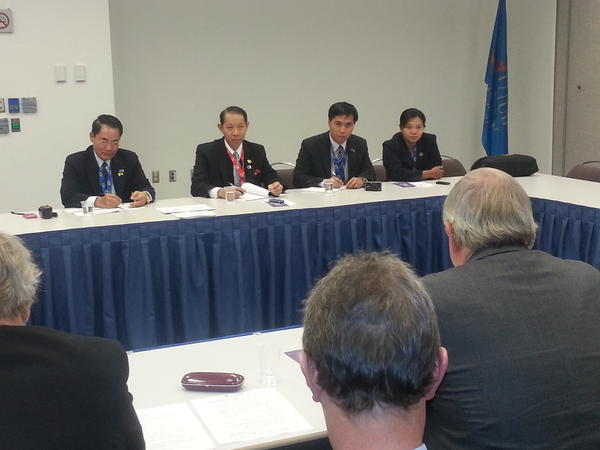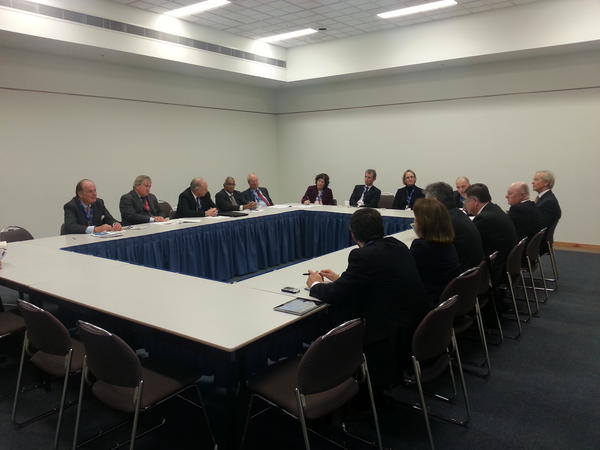

127th IPU Assembly, Quebec
The 127th IPU Assembly in Quebec City from 21 to 26 October 2012 was attended by more than 1300 participants from over 120 parliaments including over 40 Speakers.
The UK delegation led by the BGIPU Chairman, Robert Walter MP and supported by Deputy Speaker Nigel Evans MP, Ian Liddell-Grainger MP, Lord Davies of Stamford, Rt Hon Lord Dholakia OBE DL, Lord Faulkner of Worcester and Lord Judd was active in all sessions of the Assembly.
The theme of the 5 day conference was “Citizenship, identity and linguistic and cultural diversity in a globalised world”. This topic was debated in Plenary by delegations following addresses by a number of keynote speakers including the Canadian Foreign Minister, the Hon. John Baird. The UK delegation leader, Robert Walter MP, highlighted the diverse character of the United Kingdom and how this has shaped Britain’s unique political and social landscape. He called on all delegations to unite in celebrating cultural and linguistic diversity to promote in the IPU its core values of democracy, human rights and the rule of law. The following is a record of the speeches given by the Leader of the Delegation Robert Walter MP and Lord Faulkner of Worcester in this debate;
127th IPU Assembly – Quebec City, Speech by Robert Walter MP
‘Citizenship, identity and linguistic and cultural diversity in a globalized world’
Mr President, Quebec is the ideal place to debate linguistic and cultural diversity, a unique city in North America. I thank you, the Canadian delegation and the Canadian Parliament for the hospitality we have received this week.
As a British MP for over 15 years, I have witnessed tremendous change in society. As a young man in the 1960s, I saw a country with some 53 million people who accepted that we had one religion established by the State.
That figure has risen to 63 million and, as of today, British people comprise a multiplicity of ethnic, religious and national groups and characteristics, with some 250 languages spoken across numerous communities – from English and Welsh to Arabic and Amharic.
The UK can be described as truly diverse because of the immigration of different groups into the UK over the past 50 odd years. But seismic international shifts over the past decade – including migration, the expansion of the European Union, political devolution and global terrorism – have coalesced to reshape both the face of Britain and its broader policy agenda.
The period between 2001 and 2010 saw the most swift and significant change in the UWs foreign-born population, due in some part, but not limited to, the 2004 and 2007 enlargements of the EU.
In 2001, 8.3% of the population were foreign born; in 2010 that number had risen to 11.3% of the total population. As of 2012, approximately 1 in 7 primary school children are learning English as a second language.
Dramatically shifting demographics are posing serious questions about the impact of diversity and, in particular, the nature of ‘Britishness’. But it would be a mistake to suggest that multicultural Britain is an entirely recent phenomenon.
Let us remember that the United Kingdom is made up of 4 component nations, each with their own unique traditions, histories and languages. You will know the football teams.
Though not a federal State, the modern UK has evolved through 3 Acts of Union – with Wales, Scotland and Ireland – and one Act of Secession which created the Irish Free State in 1922 (today’s Republic of Ireland), and the British province of Northern Ireland.
All of these national traditions have led to the creation of regional, or “nationalist” political parties in Wales, Scotland and Northern Ireland which join and work together in the UK Parliament to give their national constituents a voice.
The UK’s experience teaches us two things: First, that Britain could never in its history be described as a truly homogenous cultural entity, having been influenced by millennia of migration and political upheavals. Second, that identity is a fluid, not fixed, concept. For sure, we all identify with our roots, which anchor us to our origins; be it religious, ethnic or national. Our roots bind us to a historical past with whose traditions, values and languages we continue to correspond. But roots are only part of the story.
How do we reconcile cultural diversity with Citizenship? The link between diversity and citizenship is clear: while celebrating the diverse cultural backgrounds of the UK’s population, we must acknowledge what brings us together as active citizens for change.
In conclusion Mr President, I will remain Welsh and British, European and a citizen of the world. Let us all unite in cultural and linguistic diversity and promote in the IPU our values of democracy, human rights and the rule of law.
127th IPU Assembly – Quebec City, Speech by Lord Faulkner of Worcester
Mr President, fellow parliamentarians. In my two minutes I want to speak about the importance of parliament reflecting and representing diversity and minority interests, and put this into a British context.
Britain is an increasingly multi-ethnic and diverse community. Those of you who watched the Olympic Games this summer will have seen how many of Great Britain’s medal winners were from non-traditional British backgrounds – and what was particularly heartening was the way the British public took them all to their hearts, cheering equally loudly for stars such as Mo Farah as for Victoria Pendleton and Bradley Wiggins. The non-white population of the UK is now 10 per cent overall, and much higher than that in major cities such as London, Birmingham, Leicester and Bradford.
And the huge success of the Paralympics also turned disabled sportsmen and women into national heroes.
In our two houses of parliament we try to ensure that this ethnic and cultural diversity is properly represented. We have certainly made a start, but there is still a long way to go. The 2010 general election returned a record number of black, Asian and minority ethnic candidates to the House of Commons – a total of 27, but that’s still only 4 per cent of the total representation.
Only a handful of MPs identify themselves as disabled, and the number of openly gay MPs is just 17. There are 143 women members – more than before – but at 22 per cent far short of equal numbers to men.
The situation in the House of Lords is rather better. Since 2000, when new appointment arrangements came into force, 37 per cent of new peers have been women. Four out of the last six leaders of the house have been women, as have both the first and the current Lord Speaker, and the present government chief whip. The Lords have 48 ethnic-minority members.
Disability causes are well represented, with a number of active wheelchair users – including Tanni Grey-Thompson, Britain’s most successful Olympian athlete – plus a highly articulate campaigner for blind people.
And the house has members, male and female, who are gay, and recognises peers with civil partners in its policies relating to travel, security passes and so on. Because we do not elect members of the House of Lords, the house can be genuinely representative of the nation, as the appointments process caters for almost every minority interest.
It is essential, Mr President, that parliaments are able to represent the whole communities which they serve. That means adopting policies that are friendly towards those who are outside the mainstream of majority society, and ensuring that they contain members who can speak up for them.
Activies of the British Delegation
The UK also proposed debate on an emergency item regarding the security and humanitarian impacts of the situation in Syria including its neighbouring countries. This proposal was considered by the Assembly alongside proposals from the UAE, Syria and Mali. Mali’s resolution on the situation in its country gained the required two-thirds support for discussion.
In addition to participating in the Plenary, the UK delegation met with the delegations of Russia, South Sudan, Palestine, Serbia, Argentina, Israel, Saudi Arabia and Burma for discussions on issues of bilateral concern including exploring opportunities for inter-parliamentary exchanges and potential partnerships for parliamentary strengthening.
The UK delegation also participated in debates concerning a wide range of issues including the use of social media to enhance citizen engagement and democracy, the role of Parliament in safeguarding civilians’ lives and innovative financing mechanisms for sustainable development. The delegation also attended panel sessions on Multilateralism and the role of parliamentary diplomacy, building peace after conflict and creating opportunities for youth in today’s global economy. The UK delegates also participated in the Committee on Middle East Questions, spoke in a special session on Gender-sensitive parliaments and observed the work of the Committee on the Human Rights of Parliamentarians.
The UK candidacy for Lord Judd to take up a titular position on the IPU Committee on Middle East Questions was successful and he was elected to this post by the 127th IPU Assembly
Conclusions of the Assembly
The full outcomes of the 127 IPU Assembly are available here.
The Summary of the meeting are also available here.













